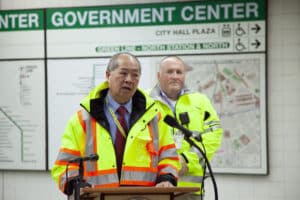
MBTA General Manager Phil Eng speaks to reporters from a podium set up on the Green Line platform at Government Center on Feb. 15, 2024. Photo by Chris Lisinski | State House News Service
MBTA overseers on Tuesday unanimously approved the latest five-year plan to invest in systemwide improvements, embracing a $9.8 billion roadmap that one watchdog group called a “nuts and bolts” approach.
The T’s Board of Directors gave the green light to the latest capital improvement plan for fiscal years 2026 through 2030, which has a bottom line about $200 million larger than the prior version covering FY2025 to FY2029 and targets several dozen additional projects.
The plan, known by the acronym CIP, outlines spending options for a range of maintenance, modernization and expansion priorities at the MBTA. Highlights in the latest iteration include center-running bus lanes on Blue Hill Avenue in Boston, infrastructure improvements for faster, decarbonized Fairmount Line commuter rail service, and upgrades to Red and Orange Line signals.
MBTA General Manager Phil Eng described the plan as “the framework that guides how the T makes critical investments in the system, establishing a foundation for stabilizing and improving service today as we build a system for future generations of riders.”
Analysts at the MBTA Advisory Board, an independent organization representing cities and towns that help fund the T, said the plan “continues major investments in [state of good repair], accessibility, safety, and resiliency which, while solid, are unfortunately insufficient.”
“GM Phil Eng and his leadership team have demonstrated success in improving public transportation infrastructure via the recently completed Track Improvement Program which removed over 220 speed restrictions and replaced over 250,000 feet of rail on light and heavy rail lines. The Authority has not demonstrated such improvements through infrastructure investments in recent memory,” the Advisory Board wrote in a 20-page report. “Despite demonstrating such success, communities note that over $13 billion in projects were requested for funding from MBTA departments, of which just over $1 billion are funded. 1/13th is not transformational, visionary, strategic, nor suitable to fund the system this Commonwealth needs and deserves; but 1/13th is what the MBTA can do with available resources.”
The T estimated in November 2023 it would cost about $24.5 billion to repair all MBTA assets that are not in a state of good repair.






